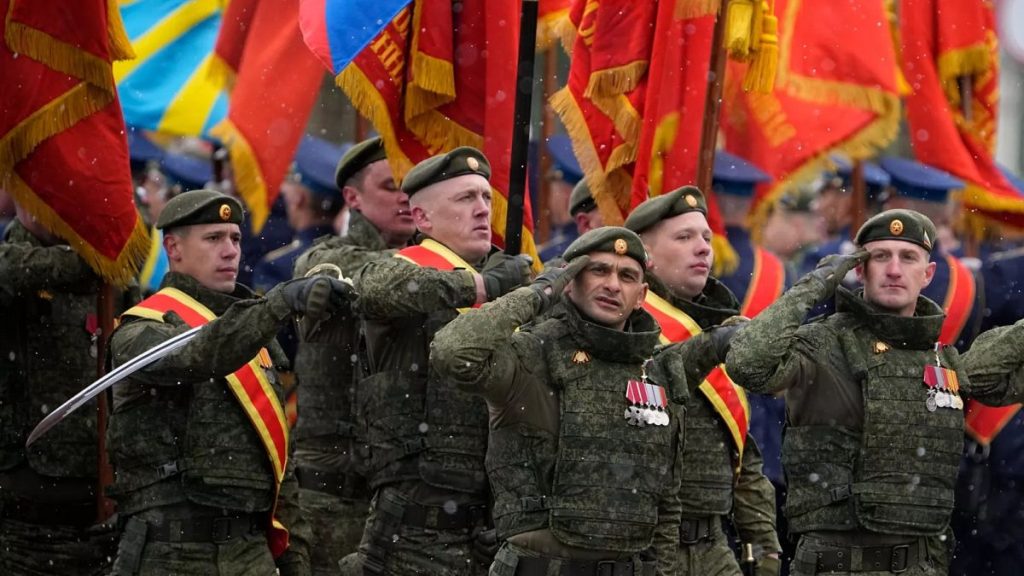The ongoing tensions between Slovakia and the European Union have come to the forefront as Slovakia’s Prime Minister, Robert Fico, has boldly asserted his intention to attend the annual World War II victory parade in Moscow on May 9. This event, marking the 80th anniversary of Nazi Germany’s defeat, has been met with significant opposition from EU officials, particularly from the bloc’s foreign policy chief, Kaja Kallas. As tensions rise due to Russia’s ongoing military actions in Ukraine, Fico’s defiance raises questions about Slovakia’s diplomatic stance and its implications within the EU.
| Article Subheadings |
|---|
| 1) Slovakia’s Defiance Against EU Guidelines |
| 2) The Context of the Moscow Parade |
| 3) Implications for Slovakia’s Foreign Policy |
| 4) The Reaction from EU Leaders |
| 5) Public Sentiment and Protests in Slovakia |
Slovakia’s Defiance Against EU Guidelines
On the backdrop of escalating tensions between the European Union and Russia, Prime Minister Robert Fico made headlines by declaring his intention to attend the Victory Day military parade in Moscow. This event, which celebrates the end of World War II, has become increasingly contentious as the EU grapples with responses to Russia’s ongoing military aggression in Ukraine. Fico’s statement, “Nobody can order me where to go or not to go,” indicates a clear resistance to pressure from EU officials. Slovakia, under Fico’s leadership, has positioned itself as one of the few countries willing to engage on celebratory terms with Russia, signalizing a significant diplomatic divergence within an increasingly fractured Europe.
The Context of the Moscow Parade
The Victory Day parade, held annually in Moscow, commemorates the Soviet Union’s triumph over Nazi Germany. This year marks the 80th anniversary of that victory, a fact that has further fueled the significance and the military display that accompanies the event. Russian President Vladimir Putin has utilized such parades to highlight military strength and patriotism within Russia, particularly emphasizing the narrative of heroism surrounding Russian troops engaged in conflicts, such as the ongoing war in Ukraine. Fico’s participation in this parade could thus be interpreted as a nod to the Kremlin’s narrative and potentially as a rejection of Western condemnation of Russia’s actions.
Implications for Slovakia’s Foreign Policy
Fico’s decision to attend the parade raises important questions about Slovakia’s foreign policy trajectory. After taking office following an electoral victory centered around pro-Moscow sentiments, Fico has shifted Slovakia’s international alignments dramatically. He has publicly criticized EU sanctions aimed at Russia and pledged to halt military support for Ukraine. Such a shift not only affects bilateral relations with Ukraine and the EU but also reflects a broader trend towards neutrality or even alignment with Russian interests in Eastern Europe. These actions may result in strained relationships with Slovakia’s traditional allies and potentially undermine the EU’s unified stance toward Russia.
The Reaction from EU Leaders
In response to Fico’s intentions, EU officials have publicly voiced their disapproval. Kaja Kallas, the EU’s foreign policy chief, emphasized the potential consequences of attending the Moscow parade, noting that “any participation… will not be taken lightly” by European nations. She has urged other member states, particularly those with candidate status like Ukraine, to refrain from engagement with Russia at such events, instead recommending a collective commemoration in Kyiv. Kallas’s comments reflect a worry that attending the parade could signal tacit support for Russia amidst its aggressive military actions in Ukraine.
Public Sentiment and Protests in Slovakia
The political climate in Slovakia under Fico’s government has heightened public dissent regarding his administration’s pro-Kremlin stance. Recent protests have centered on various government decisions, including controversial legislation targeting non-governmental organizations (NGOs), which many believe echoes authoritarian measures seen in Russia. These protests illustrate a growing discontent among segments of the Slovak population who fear that their country may drift away from democratic norms and align too closely with Moscow’s political objectives. As Fico prepares for his trip to Moscow, public sentiment remains divided, with many expressing concerns about what this signifies for Slovakia’s future.
| No. | Key Points |
|---|---|
| 1 | Prime Minister Robert Fico plans to attend the Moscow Victory Day parade. |
| 2 | EU officials, including Kaja Kallas, have condemned participation in the event. |
| 3 | Fico’s government has shifted Slovakia’s foreign policy towards a pro-Russian stance. |
| 4 | Public sentiment in Slovakia is mixed, with ongoing protests against Fico’s policies. |
| 5 | The implications of Fico’s visit highlight potential divisions within the EU regarding Russia. |
Summary
The decision by Prime Minister Robert Fico to participate in the Moscow Victory Day parade amidst rising tensions in Europe underscores a significant pivot in Slovakia’s foreign policy. As EU leaders express their concerns regarding his involvement, it could lead to deeper divisions within the European block concerning relations with Russia. The ongoing public protests within Slovakia further amplify the need for scrutiny on the implications of such stances for the nation’s democratic principles and its relationships with both the EU and neighboring Ukraine.
Frequently Asked Questions
Question: What is the significance of the Moscow Victory Day parade?
The Moscow Victory Day parade commemorates the Soviet Union’s victory over Nazi Germany during World War II. It serves as a platform for Russia to showcase its military strength and national pride.
Question: How has Fico’s government altered Slovakia’s foreign relations?
Under Fico’s leadership, Slovakia has tilted towards a pro-Russian stance, criticizing EU sanctions against Russia and ceasing military support for Ukraine, thereby altering its traditional alignment with Western policies.
Question: What are the public’s views on Fico’s decision to attend the parade?
Public sentiment in Slovakia is divided; while some support Fico’s decision to honor historical struggles against Nazism, others fear it signals a dangerous rapprochement with the Kremlin and a departure from European democratic norms.


